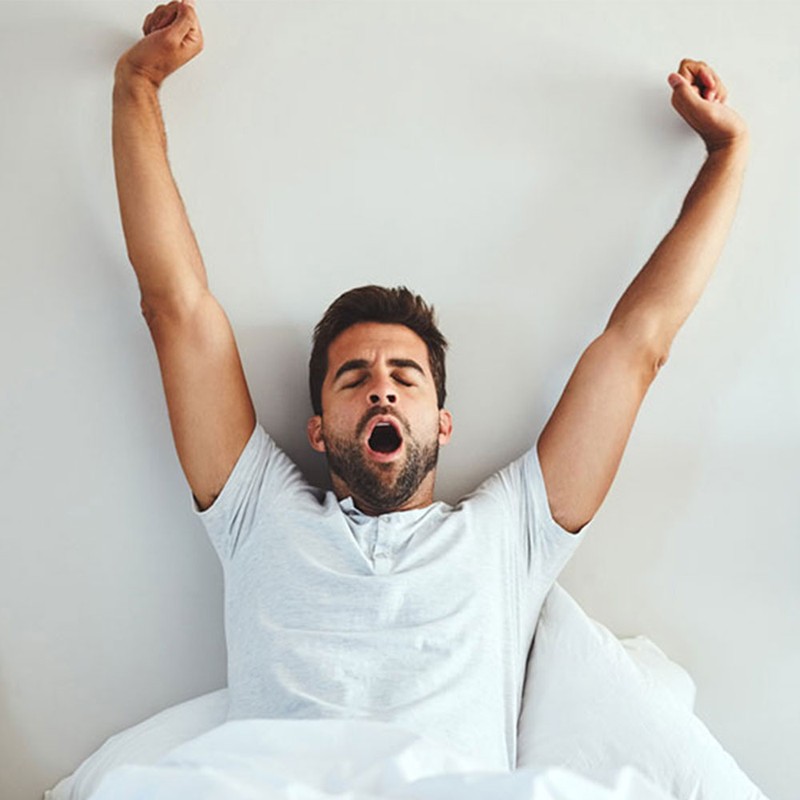The Man’s Guide To Sleeping Well
Firstly, how much sleep do we actually need?
Research shows we should be getting eight hours of sleep every night, although most of us get around seven, according to the Royal Society for Public Health.
And why do we need it?
The importance of sleep has become more widely acknowledged and is now considered the holy grail of good health alongside diet and exercise. While you sleep, the brain processes information; muscles and joints are given the opportunity to recover from daily wear and tear; and protein is replenished to all parts of the body. We have all experienced the short-term impact of sleep deprivation, which affects our mood, memory, creativity and overall well-being. Long term, this can have much more serious health consequences by encouraging inflammation in the body and increasing our risk of heart disease, diabetes and stroke. Early research has also suggested long-term sleep deprivation can influence body weight and gut bacteria.
What keeps us awake?
One of the biggest reasons is stress and anxiety. Sleep hygiene is also important. This includes our bedroom environment, overuse of electrical equipment before bed, uncomfortable mattresses, and the food and drink choices we make.
What can we do to sleep better?
While we all understand the importance of maintaining a healthy weight, eating well and keeping active, sleep is still something many people choose to do little about. Non-sleepers are very good at saying how badly they have slept while doing little to tackle the issue. The key to sleeping well is identifying the things preventing you from doing so, then developing a ritual that is personal to you. This ritual should encompass strategies to help you create an environment that invites you to sleep.
Top Ten Essentials To Encourage Sleep
- Find your rhythm
Establish and stick to a set bed and wake time. Erratic work schedules and busy social lives can make this tricky, but try and stick to this pattern as much as you can. This also means avoiding hitting the snooze button on the weekend because there is no such thing as ‘catching up on sleep’.
- Jot down your thoughts
This is simple but effective. Jot down your list of things to do the following day and any other thoughts that may be playing on your mind. If you get up during the night thinking about daily tasks or life issues, then get up and jot them down, rather than twiddling your thumbs and ruminating on a continual cycle.
- Invest in a good mattress
This is painfully obvious, but is your mattress preventing you from sleeping well? Mattresses deteriorate by as much as 70% over ten years and can contribute to stiffness, back and neck pain which can keep you awake. Invest in a new mattress every seven to ten years and do your research to find the perfect fit.
- Spend on good bedding
Breathable cotton bedding helps you maintain a stable body temperature. Choose hypoallergenic bedding as this can help to prevent allergies which can affect breathing and encourage snoring.
- Enforce a digital detox
Blue light is emitted from electrical equipment and this can inhibit the production of melatonin, which is the hormone that controls the sleep cycle. Some people may have no issue sleeping after using their laptop, phone or watching the TV but, if you struggle with sleep, this could be a key factor.
- Avoid stimulants
Some people are more sensitive to caffeine and this is down to a certain gene in their makeup. If you’re struggling to sleep, avoid caffeine after midday to see if it helps. This is not just coffee but also energy drinks, chocolate and tea.
- Limit the booze
This is the most common self-medicated sedative. Alcohol can help you to relax, but even in small amounts it can prevent some people from getting a good night’s sleep. Alcohol can cause you to wake up during the night from both dehydration and the need to visit the bathroom. The restorative part of the sleep cycle is called REM (rapid eye movement) and is also impaired by alcohol. If you do want to drink before bed, do so with your meal and leave it a few hours before bed.
- Try supplements
A number of supplements have been shown to help aid sleep. Magnesium can help with muscle relaxation and low levels are associated with insomnia and anxiety. Valerian is helpful and is a traditional herbal remedy used to treat mild anxiety which is associated with poor sleep: try A Vogal Dormeasan. Another useful supplement is 5-HTP, which is an amino acid converted to melatonin in the brain: try Healthspan Night Time 5-HTP.
- Eat a melatonin-stimulating diet
Nutrients involved in the production and regulation of melatonin include magnesium (dark green leafy vegetables, beans, pulses, lentils, oily fish and wholegrains), vitamin B6 (pulses, lentils, poultry, bananas, liver and soy foods), calcium (dairy foods, tofu, pulses, dried fruit and fortified plant drinks) and tryptophan (nuts, seeds, soy foods, cheese, poultry and oily fish). A nutrient-dense diet is beneficial for all areas of your health and, by committing to the basic principles of healthy eating, you’re more likely to ensure a good intake of these nutrients associated with sleep.
- Try a little mindfulness
Meditation can calm the mind before bed. Breathing exercises and guided visualisation are a couple of techniques; you can use apps such as Calm or Headspace to help you. If this isn’t your thing, listening to audiobooks or music before bed is a useful way to distract a busy mind.
The Art of Sleeping is available here.
DISCLAIMER: We endeavour to always credit the correct original source of every image we use. If you think a credit may be incorrect, please contact us at [email protected].


